Related Research Articles

Ragtime, also spelled rag-time or rag time, is a musical style that had its peak from the 1890s to 1910s. Its cardinal trait is its syncopated or "ragged" rhythm. Ragtime was popularized during the early 20th century by composers such as Scott Joplin, James Scott, and Joseph Lamb. Ragtime pieces are typically composed for and performed on piano, though the genre has been adapted for a variety of instruments and styles.

Ferdinand Joseph LaMothe, known professionally as Jelly Roll Morton, was an American ragtime and jazz pianist, bandleader, and composer of Louisiana Creole descent. Morton was jazz's first arranger, proving that a genre rooted in improvisation could retain its essential characteristics when notated. His composition "Jelly Roll Blues", published in 1915, was one of the first published jazz compositions. He also claimed to have invented the genre.
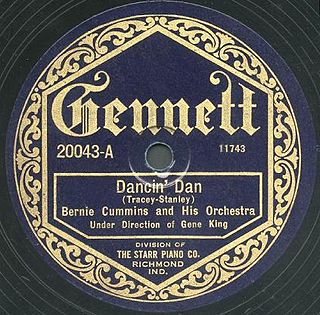
Gennett Records was an American record company and label in Richmond, Indiana, United States, which flourished in the 1920s and produced the Gennett, Starr, Champion, Superior, and Van Speaking labels. The company also produced some Supertone, Silvertone, and Challenge records under contract. The firm also pressed, under contract, records for record labels such as Autograph, Rainbow, Hitch, Our Song, and Vaughn. Gennett produced some of the earliest recordings by Louis Armstrong, King Oliver, Bix Beiderbecke, and Hoagy Carmichael. Its roster also included Jelly Roll Morton, Blind Lemon Jefferson, Charley Patton, and Gene Autry.

Barnett, Kyle (2020). Record cultures: the transformation of the U.S. recording industry. Ann Arbor, [Michigan]: University of Michigan Press. p. 42. ISBN 978-0-472-12431-2.
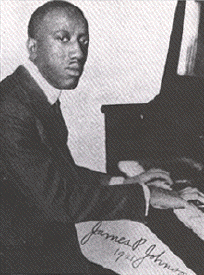
James Price Johnson was an American pianist and composer. A pioneer of stride piano, he was one of the most important pianists in the early era of recording, and like Jelly Roll Morton, one of the key figures in the evolution of ragtime into what was eventually called jazz. Johnson was a major influence on Count Basie, Duke Ellington, Art Tatum, Thelonious Monk, and Fats Waller, who was his student.

Charles Luckyth Roberts, better known as Luckey Roberts, was an American composer and stride pianist who worked in the jazz, ragtime, and blues styles. Roberts performed as musician, band/orchestra conductor, and dancer. He taught music and dance. He also owned a restaurant and bar in New York City and in Washington, D.C. Luckey Roberts noted compositions include "Junk Man Rag", "Moonlight Cocktail", "Pork and Beans" (1913), and "Railroad Blues".

Circle Records is a jazz record label founded in 1946 by Rudi Blesh and Harriet Janis.
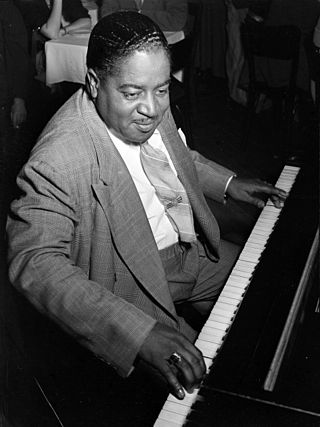
Kermit Holden "Pete" Johnson was an American boogie-woogie and jazz pianist.

"Tiger Rag" is a jazz standard that was recorded and copyrighted by the Original Dixieland Jass Band in 1917. It is one of the most recorded jazz compositions. In 2003, the 1918 recording of "Tiger Rag" was entered into the U.S. Library of Congress National Recording Registry.

Lu Watters & the Yerba Buena Jazz Band is the name of an American traditional jazz revival band founded by Lu Watters in 1940. Yerba Buena was the original name of San Francisco, California. Notable members included singer and banjoist Clancy Hayes, clarinetist Bob Helm, trumpeter Bob Scobey, trombonist Turk Murphy, tubist/bassist Dick Lammi, and Watters himself.
The Red Hot Peppers were a recording jazz band led by Jelly Roll Morton from 1926–1930. They were a seven- or eight-piece band formed in Chicago which recorded for Victor and featured some of the best New Orleans-style freelance musicians available, including cornetist George Mitchell, trombonist Kid Ory, clarinetists Omer Simeon and Johnny Dodds, banjoists Johnny St. Cyr and Bud Scott, double bass player John Lindsay, and drummers Andrew Hilaire and Baby Dodds.

The soundtrack to the film Pretty Baby used many local New Orleans musicians playing in the jazz, ragtime, and blues style of the city in the early 20th century. An LP album of the soundtrack, also entitled Pretty Baby, was issued in 1978 on ABC Records. The film is named after the song "Pretty Baby" by Tony Jackson.
"Black Bottom Stomp" is a jazz composition. It was composed by Jelly Roll Morton in 1925 and was originally entitled "Queen of Spades". It was recorded in Chicago by Morton and His Red Hot Peppers, for Victor Records on September 15, 1926.
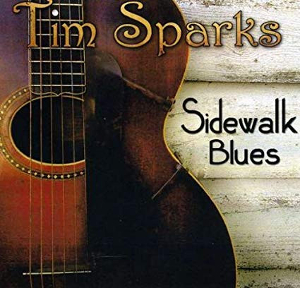
Sidewalk Blues is an album by American guitarist Tim Sparks, released in 2009. It marks a return to 'roots' music for Sparks after three albums of klezmer and jazz recordings on the Tzadik Records label.

"Original Jelly Roll Blues", usually shortened to and known as "Jelly Roll Blues", is an early jazz fox-trot composed by Jelly Roll Morton. He recorded it first as a piano solo in Richmond, Indiana, in 1924, and then with his Red Hot Peppers in Chicago two years later, titled as it was originally copyrighted: "Original Jelly-Roll Blues". It is referenced by name in the 1917 Shelton Brooks composition "Darktown Strutters' Ball".
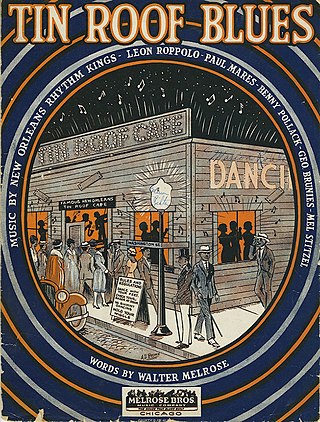
"Tin Roof Blues" is a jazz composition by the New Orleans Rhythm Kings first recorded in 1923. It was written by band members Paul Mares, Ben Pollack, Mel Stitzel, George Brunies and Leon Roppolo. The tune has become a jazz standard and is one of the most recorded and often played New Orleans jazz compositions.

The Smithsonian Collection of Classic Jazz is a six-LP box set released in 1973 by the Smithsonian Institution. Compiled by jazz critic, scholar, and historian Martin Williams, the album included tracks from over a dozen record labels spanning several decades and genres of American jazz, from ragtime and big band to post-bop and free jazz.

Jazz Man Records was an American record company and independent record label devoted to traditional New Orleans-style jazz. David Stuart (né David Ashford Stuart; 1910–1984) founded the label in 1941 and sold it to Marili Morden and Nesuhi Ertegun. The label and its namesake – Jazz Man Record Shop, in Hollywood – were in the vanguard of an international revival of traditional jazz in the 1940s.
"Weather Bird" is a musical composition by Joe Oliver. However Thomas Brothers has suggested that it was composed by Louis Armstrong, because Armstrong sent a lead sheet of "Weather Bird Rag" to Washington, D.C. for copyright in April 1923 and that, despite its 1923 copyright date, it was composed by Armstrong during his time on the Mississippi river boats.
References
- ↑ Sutton, Allan, and Kurt Nauck. American Record Labels and Companies: An Encyclopedia (1891–1943). Denver, Colorado: Mainspring Press, 2000. ISBN 0967181909
- ↑ Reich, Howard, and William Gaines. Jelly's Blues The Life, Music, and Redemption of Jelly Roll Morton. Cambridge, Massachusetts: Da Capo, 2003.
- 1 2 "Jelly Roll Morton Recordings and Discography". Monrovia Sound Studio. Retrieved 2014-07-17.
- 1 2 "Commodore Buys General". The Jazz Record, August 1946, page 18.
- ↑ "Piano Solos, Jelly Roll Morton" (Commodore Music Shop Advertisement). The Jazz Record, August 1946, page 20.
- 1 2 3 4 5 6 "Ferdinand 'Jelly Roll' Morton (1890–1941)". The Red Hot Jazz Archive. Archived from the original on 2005-11-24. Retrieved 2014-07-17.